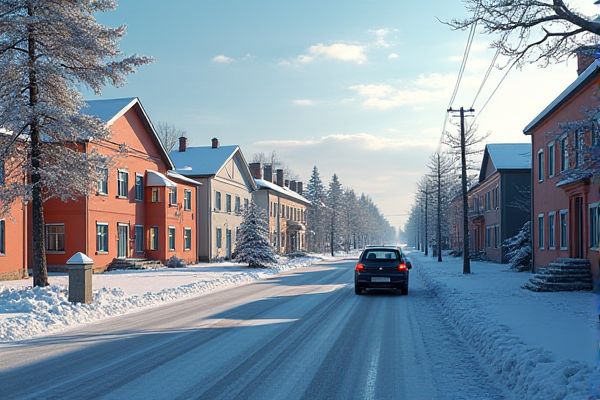
Insights from Finland residents and expatriate communities: Long, cold winters with limited daylight. Excellent public healthcare system. High quality of education. Efficient public transportation networks. Strong influence of nature and outdoor activities. High standard of living and safety. Finnish language; English widely spoken. Rich culture and vibrant arts scene. Seasonal festivities and traditions. Integration of sustainable practices.
Long, cold winters with limited daylight.
Finland's long, cold winters, which can last from November to March or even May in Lapland, are characterized by limited daylight, with Helsinki experiencing 6 to 12 hours of daylight and Rovaniemi having as few as 2 hours near the winter solstice. However, Finns and expats adapt by engaging in various winter activities like skiing, dog sledding, and sauna visits to make the most of the season. To learn more about relocating to this unique environment, visit the Expat Guide on Moving to Finland.
Excellent public healthcare system.
Finland's public healthcare system is highly regarded, boasting universal coverage, a strong focus on disease prevention, and high satisfaction rates among residents. According to a European Commission survey, 88% of Finnish respondents are satisfied with the healthcare services. The system features a decentralized, three-level structure, where primary care is provided by health centers and general practitioners act as gatekeepers to more specialized services. For more detailed information, you can visit the page about Healthcare in Finland.
High quality of education.
Finland's education system is highly regarded for its emphasis on equity over excellence, with highly trained and respected teachers, no standardized testing, and a focus on creating a holistic learning environment that prioritizes student well-being and individual development. The system also includes free school meals, access to health care, and psychological counseling, ensuring all students have equal opportunities regardless of their background or abilities. Discover more about what makes Finland's Education System the best in the world, offering a model that many other nations look to emulate.
Efficient public transportation networks.
Finland's public transportation network is highly praised by both residents and expatriates for its reliability, comfort, and comprehensive coverage. The system includes modern and punctual trains, extensive bus networks, and well-developed urban transport in cities like Helsinki, with amenities such as free Wi-Fi, comfortable seats, and frequent departures. To explore in detail about the transportation options, [Discovering Finland](https://www.discoveringfinland.com/travel/public-transportation/) provides an extensive guide on navigating the transport facilities, enhancing the traveler's experience across the country.
Strong influence of nature and outdoor activities.
In Finland, outdoor activities are a central part of the lifestyle, with a significant portion of the population engaging in them, driven by the need for physical fitness, stress recovery, and relaxation. This lifestyle is facilitated by the country's abundant natural environments and the traditional "everyman's right" to access nature. According to a study highlighted by the Helsinki Times, the Finnish dedication to outdoor pursuits showcases their deep connection to nature and the cultural importance of maintaining a balanced and serene way of life.
High standard of living and safety.
Finland is renowned for its high standard of living and safety, with low crime rates and a welcoming environment, making it one of the safest countries to live in or travel to, where residents and visitors can roam without significant hassle. Despite the high cost of living, Finland offers a safe environment, greater purchasing power with decent salaries, and universal access to healthcare and education. Although expats may initially find the locals to seem unfriendly and the language a significant adjustment, these challenges are often outweighed by the advantages. For more detailed information on health and safety, the Visit Finland website is a valuable resource that can guide your journey and ensure a secure and pleasant experience in this beautiful Nordic country.
Finnish language; English widely spoken.
In Finland, while Finnish is the primary language, English is widely spoken with 70% of the population, or nearly 3.9 million people, able to converse in English at a conversational level or higher. English is particularly prevalent in urban areas like Helsinki, Tampere, and Espoo, and is commonly used in online and work environments. For more insights, visit The History of English website.
Rich culture and vibrant arts scene.
Finland's art scene, particularly in Helsinki, is characterized by a blend of local and international influences, with a growing gallery and museum scene, strong public and private funding, and a collaborative spirit among artists and institutions, despite its relatively small size. The city hosts various prominent galleries and museums like Galerie Forsblom, Helsinki Art Museum, and Kiasma, which showcase both Finnish and international artists, reflecting the vibrant and evolving cultural landscape.
Seasonal festivities and traditions.
In Finland, seasonal festivities and traditions are deeply rooted, with Christmas Eve being the most important day, marked by the Christmas sauna, traditional meals, gift-giving, and the proclamation of "Christmas Peace" in Turku. Other significant traditions include Santa Lucia's Day on December 13 and pre-Christmas parties starting in November, all emphasizing family, food, and cultural heritage. For more details on these traditions, you can explore more on A Time Of Tradition. These celebrations reflect the rich cultural heritage and the shared values that bring families together during the festive season.
Integration of sustainable practices.
Finland's integration of sustainable practices is highly valued and participatory, involving extensive engagement from residents, expatriate communities, and various stakeholders. The country's approach includes multi-stakeholder participation, with mechanisms like the National Commission on Sustainable Development and Society's Commitment to Sustainable Development, ensuring broad involvement in policy-making and implementation of the 2030 Agenda for Sustainable Development.
